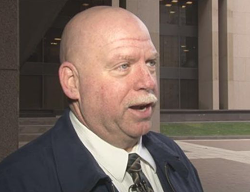CLEVELAND, Ohio — The head of Cleveland’s largest police union said he has “respectfully declined” the demands from 10 members of the Community Police Commission that he resign his seat, saying he represents a constituency that would otherwise be voiceless on the commission.
Steve Loomis, president of the Cleveland Police Patrolmen’s Association, wrote in an email sent to a cleveland.com reporter late Wednesday that one of the reasons he won’t resign is because “I am the only commissioner currently representing ALL law abiding citizens in Cleveland not just small fragments of them.”
Included in the email was a note Loomis said he sent to commission members in response to proposed changes to the commission’s bylaws that could lead to members being removed.
Often a lightning rod for controversy because of his efforts to support President-elect Donald Trump and his statements on police shooting cases, Loomis wrote that he feels he is being targeted because he is “the only heterosexual, white male, conservative, Catholic, married father and grandfather, military veteran, 23 year resident of Cleveland with 23 years of decorated law enforcement experience.”
He wrote that “most on this commission show their hypocrisy by demanding tolerance, open mindedness, and transparency from everyone but themselves.”
Chief U.S. District Judge Solomon Oliver Jr. will hold a status conference Dec. 12 to talk about the city’s progress under the settlement the city reached with the U.S. Justice Department over police use of force. Among the items the judge wants to discuss is “the current composition, leadership and staffing of the Community Police Commission,” according to court records.
The 13-member commission is tasked with making policy recommendations to the police department. Its creation was mandated in the city’s settlement, known as a consent decree.
Under the consent decree, 10 of the members are to be chosen by a selection panel appointed by Mayor Frank Jackson, while each of the city’s three police unions — the patrolmen’s association, the Fraternal Order of Police and the Black Shield — each get one designee.
Problems with the commission arose not long after it was formed. Three members resigned, including one police sergeant for what he said was a hostile atmosphere at meetings and an unwillingness by some on the commission to listen to all points of view. Others complained of personality conflicts.
The police monitor, meanwhile, said the commission is completing the work it is required to do under the consent decree.
Loomis’ presence on the commission has been a sticking point for many members and activists. Local groups have called for Loomis’ removal based on statements he made that they feel undermine the consent decree.
The letter commission members sent to him in November asking that he resign said he had missed 10 full meetings since Jan. 27. In a separate letter sent to the judge, Justice Department, mayor and police monitor seeking his removal, the commission members say Loomis comments and actions show he does not believe that the police department needs reform.
They asked that the judge incorporate ways to remove members into the consent decree and to change the way police appointees are put on the commission.
Loomis has had a ubiquitous presence in local and national media as the city reckons with reforming the police department.
The Black Shield, which represents black Cleveland police officers, openly criticized Loomis and the patrolmen’s association’s efforts to support Trump, whose statements on the campaign trail show that he will largely not support the efforts that President Barack Obama’s Justice Department pushed to ensure constitutional policing.
Loomis has also fiercely defended the actions of officers Timothy Loehmann and Frank Garmback, who were involved in the police shooting death of 12-year-old Tamir Rice in November 2014.
Loomis implied in his email to commission members that he is not included in important discussions and decision making. He wrote, “the message clearly being sent by the attempted manipulation of the bi-laws, the manipulating of fact, the secret meetings, emails and discussions excluding some members … is intolerance at all costs!”
In the email to cleveland.com, he also criticized the recent appointment of Cleveland lawyer Gordon Friedman to the commission, writing that because Friedman works as a civil rights and criminal defense lawyer, his appointment “weakens the credibility of any recommendations made by the (commission).”
Friedman’s law firm, which he runs with attorney Terry Gilbert, frequently brings lawsuits against Cleveland police in high-profile cases. For example, the firm secured a multimillion-dollar verdict in September 2015 against an off-duty officer who fatally shot a 20-year-old Euclid man during a 2012 downtown traffic stop.
Loomis wrote, “to put someone with a vested and financial interest in a position to influence the very policies he and his law firm routinely challenge and sue against is likened to allowing the fox to live in the henhouse and is not in the best interest of the citizens of Cleveland or the city itself.”
Cleveland.com reached out to the Justice Department, the city and the monitor to see if they would back changing the consent decree to address the removal of members.
City spokesman Dan Williams responded with a cryptic statement saying “we will follow the consent decree.”
U.S. Attorney’s Office spokesman Mike Tobin said the Justice Department would state its position at the Dec. 12 status conference.
Head monitor Matthew Barge did not return a phone call.
http://www.cleveland.com/court-justice/index.ssf/2016/12/controversial_cleveland_police.html


